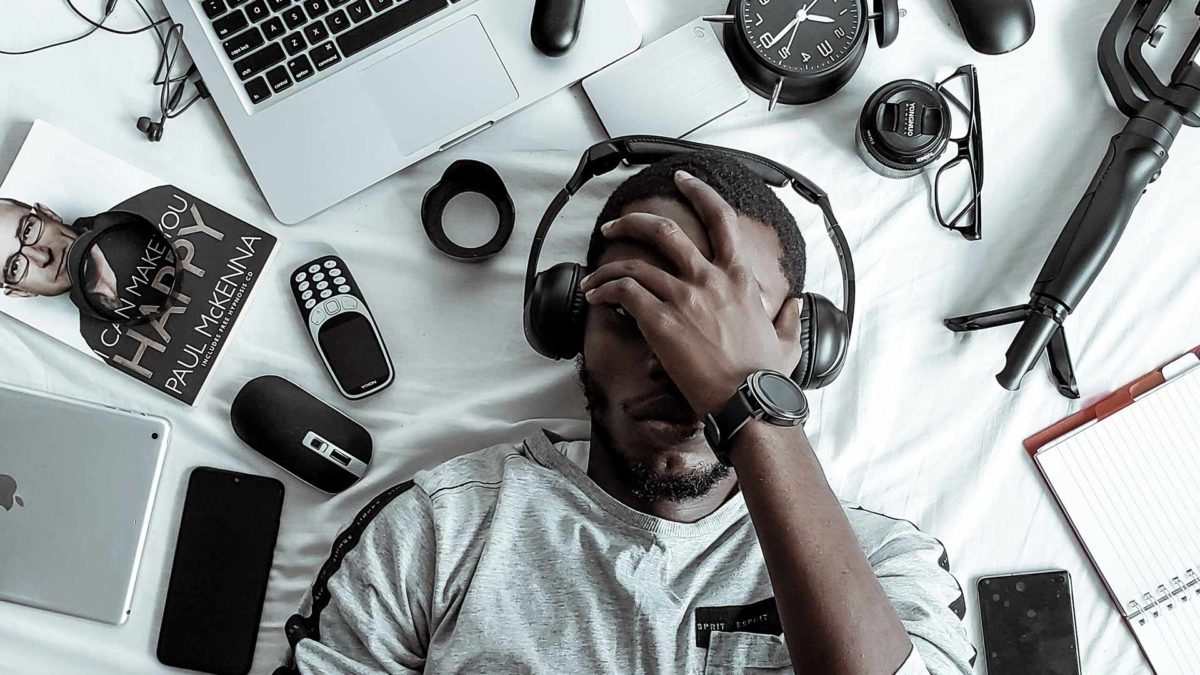How can technology affect your mental health?

By Sanjay Singh, Bupa
How can technology affect your mental health?
Bupa explain some of the ways that too much technology could affect your mental health and share their top tips to help you get the balance just right.
Whether you’re using the latest accounting software or ordering a last-minute birthday gift, it’s hard to remember a time when technology didn’t make everyday life that little bit easier. This has been particularly true over the last 18 months. During the pandemic, technology helped us to stay connected with loved ones, continue working remotely and discover the best recipe for lockdown banana bread.
In the UK, it’s estimated that adults spent more than 3.5 hours online every day in 2020. But although technology has lots of benefits, you might have found that regular videocalls or replacing your commute with longer working hours has left you with screen fatigue. Spending too much time online and on screens could have a negative impact on your mental wellbeing.
Here we’ll explain some of the ways that too much tech could affect your mental health and share our top tips to help you get the balance just right.
Disturb your sleep
There’s no denying that modern technology has changed the way we work and live. In 2020, research found that 77 per cent of employees use a computer, and 43 per cent use a handheld device every day. All this screen time could get in the way of a good night’s sleep if you let it. But when used in the right way, you may find some sleep technologies help you unwind at the end of the day. Perhaps you enjoy tracking the quality of your sleep using a fitness device, listening to sleep stories on a meditation app, or using a light alarm clock that mimics the sunrise.
But checking your work emails late at night, scrolling through social media before bedtime or staying up late to watch TV, can disrupt your sleep. This is because the blue light emitted from your digital devices can impact your body’s natural sleep cycle and reduce how much melatonin – the sleep hormone – you produce. And not getting enough good quality sleep can impact your emotional and mental wellbeing.
Top tips:
- Take charge ofyour digital wellbeing by switching your devices to ‘night mode’ or dimming them in the evening. This will help to reduce the amount of blue light they emit.
- Turn all your devices off at least an hour before bed, and do something that helps you to unwind, like reading a book, taking a bath or doing a bedtime meditation.
- If you use the alarm on your phone to wake you up in the morning, invest in an alarm clock and leave your phone in another room at night.
- Replace your night-time scrolling habit by reviving some old hobbies, like baking, jigsaws, arts and crafts, or boardgames.
Reduce your concentration
Whether you’re booking your next holiday while on the train to work, or ordering dinner while you pick the kids up from school – using technology can help you to stay organised and multitask.
But if you’re juggling multiple devices, platforms, apps and systems, chances are you’re getting a lot of notifications each day. It could be emails popping up on your laptop, messages pinging on your phone or news stories flashing on your tablet. But if you’re constantly being interrupted, distracted and trying to multitask, you might find you’re struggling to focus on one thing at a time.
Top tips:
- Turn off your notifications and pop-ups. This could include your emails, messaging and apps across all your devices. You can also mute conversations and group chats for a few hours or more.
- Remember to take regular breaks from your screens both at work and home. For example, going for a walk at lunchtime and leaving all your devices behind. Or scheduling an afternoon of completely tech-free time to do something you enjoy.
- Become the master of your own schedule. For example, you could try blocking out time in your calendar for focused work, setting an out of office and closing your emails completely during this time.
Disrupt your work-life balance
Adopting technology in the workplace can help you to make processes more efficient and communicate effectively. It can also help you connect with people across different locations and time zones and work flexible hours if you need to. Not only that, but technology has enabled many businesses to continue working remotely during the pandemic. In some cases, it may even mean you can now apply or hire for a job that’s based in another location. This level of flexibility can help you stay motivated and engaged at work.
But an ‘always-on’ culture can also blur the line between your work and home life. Although most employees find using smartphones and tablets for work helpful, 29 per cent find that they also blur boundaries between work and home. You might feel under pressure to be visible all the time, respond to messages immediately, hit tight deadlines and prove you’re being productive. This can make it harder to switch off and strike a healthy work-life balance.
Top tips:
- Set clear boundaries between your work and home life by making sure you log off on time. It might help to set a reminder or alarm to alert you when it’s time to take lunch and switch off from work.
- Get to know the time-management tools and features available on your devices and use these to your advantage. For example, you could try setting your messaging apps to ‘Do Not Disturb’, or working ‘Offline’ to stop new emails from coming in.
- If you can, have separate work and personal phone numbers and turn your work phone off in the evenings and weekends.
Impact your mood
Since 2013, using social media at work has increased from 27 per cent to 37 per cent. But 84 per cent of employees say they manage to keep their professional and personal social media accounts separate.
Social media can be a great way to connect with other people, create a sense of community and access services and information. Some studies have found that having positive exchanges on social media can have a positive effect on your mood and help you to feel connected and supported. But having a negative experience on social media has been linked to feelings of anxiety and depression. You might find you’re comparing yourself to other people, have unrealistic expectations, low self-esteem, a poor body image or feel dissatisfied with your own life.
Although more research is needed to fully understand the relationship between social media and mental health, the quality of your interactions has a role to play.
Top tips:
- Take control of how you spend your time online. Start by deleting, unfollowing and unsubscribing from anything that makes you feel unhappy or anxious. This could include social media accounts, email chains or apps. Instead, fill your newsfeed with positive things that make you feel good – such as education, comedy and your hobbies and interests.
- Limit how much time you spend on your devices. Lots of digital devices like smartphones now have time limit options built into the settings. For example, you can block access to your social media apps during your working hours. You can also create an alert that tells you when you’ve been on a particular app for more than a defined period of time. If your phone doesn’t have these settings, there are also apps you can download that help you to do this.
- Prioritise real relationships over virtual ones, by getting creative with your meetings. For example, if you’re in the office, why not meet face-to-face over a coffee. And if you’re working from home, arrange a phonecall where you and your colleagues can walk, talk and get some fresh air.
- When life’s non-stop, taking time out for a health issue might not feel like an option. Which is why, with Bupa, you’ll get fast access to treatment and specialist support, so you’ll soon be back to business as usual.












